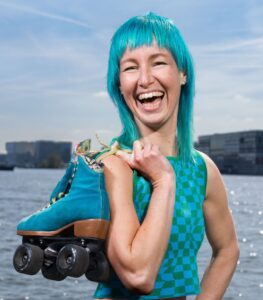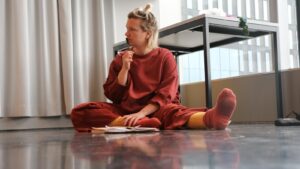How can the university be understood not just as a forum for the exchange of ideas and a workshop for the fashioning of knowledge, but as a venue for the circulation and reproduction of embodied affects and emotions? What are the emotional priorities that go into teaching, research and writing across disciplines? What are the pleasures of academic work? How do institutional pressures, burnout, prestige, discrimination, and other dimensions of academic life transact with affect? How are systemic inequalities based on race, class, caste, and gender produced, navigated, challenged, and transformed through circuits of embodied emotions?
These were the questions behind our roundtable session “Affects, Power, and the University” at the 2024 4S-EASST in Amsterdam. Donovan Schaefer, Esha Shah, Lisette Jong and Ulrike Scholtes made short interventions after which we further explored the abovementioned topics together with the audience. Our conversation was prompted by recent work on the relationship of emotion to knowledge-production, specifically Esha Shah’s Who Is the Scientist-Subject? Affective History of the Gene from 2018 and Donovan Schaefer’s Wild Experiment: Feeling Science and Secularism after Darwin from 2022, which won 4S’s Ludwik Fleck Prize in 2023. This literature has a long pre-history in science studies, particularly in the work of feminist science studies scholarship like Evelyn Fox Keller’s 1983 classic A Feeling for the Organism (see also Bordo, 1989; Grosz, 1994; Hume, 1896, 2007; Jaggar, 1989; James, 1907; Polanyi, 1962; Rosfort and Stanghellini, 2012; Shapin and Lawrence, 1998; Thagard, 2006). But these approaches remain a minoritarian voice. This foundation has largely been neglected—and even obstructed—within the field of science studies.
Keller echoed the same sentiment to Shah in a letter after reading the draft of Who Is the Scientist-Subject?, she wrote:
yours is an ambition that I shared quite fully in my early work in the history and philosophy of science. Certainly, to bring the affective springs of scientific reasoning to the fore was a central aim of my McClintock book, and even more explicitly so, of Reflections on Gender and Science…. Ultimately, however, I gave up. The resistance in the history of science community to any kind of subjective analysis…was just too strong. (Keller, personal correspondence to Shah).
Any number of explanations are available for this resistance. Across the humanities and social sciences, there is widespread suspicion toward affective accounts of experience, history, and power. In the wake of the linguistic turn, as Eve Sedgwick has noted, linguistic representation has become a kind of orthodoxy—the default template for critical analysis across the humanities. (Sedgwick, 2003, p. 93). There seems to be, simultaneously, an anxiety among humanists about the perception that our work is unserious—soft—which leads to an allergy to making emotion an analytic focus. Emotion becomes the thing that needs to be erased in order to arrive at “hard” truths. Although this is often taken as the “radical” position, in actuality, the prevailing disdain for emotion of western modernity is simply reaffirmed by the so-called critical apparatus of the university itself.
As Keller observed, this ambient hostility to affective analysis is especially acute when it comes to science studies. Precisely because of the deep embedding of what Schaefer has called the “thinking/feeling binary” in the contemporary university, most accounts of knowledge-production actively preclude attention to feeling (Schaefer, 2022, p. 4). Our roundtable set out to correct this deficiency. We explored a number of different dimensions of the emotions of the university, all with an eye to paying attention to how they transacted power relations.
Intellectual Pleasure and Cruel Optimism
In his contribution to the roundtable, Donovan Schaefer noted the plurality of emotions associated with academic life. Scholarship is a source of pleasure. This statement is both blindingly obvious and verboten in accounts of scientific knowledge-production. Research is a playground, a field in which the dynamic of research, experimentation, and discovery can produce a complex dynamic of frustration and excitement, disappointment and joy. Science (as generations of science studies scholars going back to Fleck (1979) have shown) is also social. That’s an epistemological point about the communal nature of contention, collaboration, validation, and verification. But it is also about social emotions. This moves well beyond appeals to “sociality” as an explanatory terminus; it activates attention to the pleasure of a deep intellectual connection with a long-term correspondent, the excitement of a research team’s late-night breakthrough, and the strange, antagonistic spur of a professional rivalry.
These emotions are what make the university possible. It’s only because the university is saturated with feeling that we’re all here in the first place. But they are also, Schaefer argued, part of what makes the university a site of exploitation and oppression. Lauren Berlant (2011, p.1) coined the term “cruel optimism” to name what “exists when something you desire is actually an obstacle to your flourishing”. It is, in other words, precisely because the university is so emotionally rich that we find ourselves often clinging to it even when it is causing damage.
Feeling Vulnerable in the University
The stories shared during the roundtable by Esha Shah and Lisette Jong made clear that not all bodies and affects are equally welcomed at the university. Some are oppressed, punished, or painfully neglected. Crying in response to any intense professional experience, Shah noted, is an emotional expression that is consistently invalidated and disapproved, even disdained with potential consequences for those who violate this boundary. The experience of feeling unwelcome at the university is a product of the pervasive figure of the academic as a mastermind without a body, as Jong powerfully argued. The body of the mastermind is unmarked—and can therefore enter the university unnoticed. It reminds us of what Margaret Thornton (2013) calls the “benchmark man”—the figure of the ideal academic under the liberal myth of meritocracy that defines academic success.
In 2023, Jong received the Mullins award from 4S and requested institutional funding to travel to Honolulu for that year’s conference. Within a week and a few short emails, the request was approved. But Jong felt a stinging contrast with the procedure she had to go through when she needed an extension of her PhD due to an acquired chronic disease. That earlier process occupied many stressful months of waiting, uncertainty, and the work of lobbying, documentation, and evidence-gathering. Even this labor only resulted in a minimal extension.
This extra work was not just a waste of time: it defined the emotional landscape of the university as one of anxiety, frustration, and indifference, if not hostility. The contrast made painfully apparent what the university cares about: Thornton’s “benchmark man,” the unmarked body bringing status and prestige to the institute, rather than the actual knowledge-producing body of a chronically ill researcher. This can also be seen in grant schemes, which require a researcher to work full- or near-full-time, making it impossible that a body limited in working hours by disease could become a successful academic. These instances of academic life in which the body of the researcher becomes an obstacle shade in the relation between power, affect and the university. Mixed feelings of pain and pleasure define the balancing act between proximity and distance to the university.
These conflicting feelings raised one of the key concerns of many people in the room during our session in Amsterdam: How could it be otherwise? Ulrike Scholtes, Ellen Algera, and Sonja Jerak-Zuiderent teach a course on “Feeling Science” at the University of Amsterdam that centralizes the embodied practices of knowledge-making. Students learn to feel their bodies as an integral part of what it is to do science. Methods explored in the course actively break down the thinking/feeling binary. Could taking affective relations and feelings in academic work seriously contribute to making universities more welcoming places? Does training students to attune to their bodies and articulate the affective dimension of scholarship open up space for different academic positionalities? Can we envision an institutional environment in which we can safely articulate feelings—and in the process do the anti-colonial, queer, feminist, and diversity work needed to build more welcoming workplaces?
Emotions Tell the History of the Present
In her book Affective Histories of the Gene, Shah (2018) analyzed life histories of pioneering scientists to understand how their subjectivity shaped the history of genetics. Geneticists’ life histories, she showed, link political, cultural, and historical factors to scientific knowledge-production. This method relinks macro-level history of science with micro-level life stories. In her contribution to the roundtable, Shah asked how we can move from such “bird’s-eye view” of history of science to the “earthworm’s-eye view”: How do we consider embodiment and embeddedness—like an earthworm burrowed in soil—in telling our (her) stories of doing science, now and here? What does writing the history of the present look like?
As a woman of color who has worked in predominantly white, western universities for two decades, Shah commented on how racial and patriarchal hierarchies fused with the neoliberal institutional necessity of converting everything human and embodied into what Esther Turnhout (2014) calls “measure-mentality” , significantly shape everyday-ness of working with the University. Shah observed that micro-aggressions—including the long-lasting after-effects of painful incidence of sexual abuse—bleed into her mundane, embodied experiences of working in the university.
Shah posed the suggestion that we can only write the history of the present by attending to emotions. This includes paying attention to how discriminatory structures are felt and experienced in everyday context. The key methodological question for such history of the present is, she posed: how to deal with the demand for anonymity that academic institutions procedurally often impose—and still be able to tell authentic stories of abuse and discrimination that routinely occur? Shah proposed paying further attention to the phenomenology of discrimination in higher education institutions— by bringing buried embodied experiences to the surface, by ‘marking’ the feeling and experiencing bodies of researchers and teachers, as Jong also proposed during the roundtable. Shah ended her presentation with Derrida’s question: What if eyes are there to weep rather than see? (Derrida, 1993).
We thank the audience/participants who shared their own stories and helped make visible the entanglements of power and affect in the university. We hope this is not the last time this topic is on the table at an STS conference. We continue to wrestle with the foundational question: What are the consequences when a university asks us to leave embodied emotions at the door?

References
Berlant, L. (2011). Cruel Optimism. Durham: Duke University Press.
Bordo, S. (1987). The Flight to Objectivity: Essays on Cartesianism and Culture. Albany: SUNY press.
Derrida, J. (1993). Memoirs of the Blind. The Self-Portrait and Other Ruins. Translated by Pascale-Anne Brault and Michael Naas. Chicago: The University of Chicago Press.
Einstein, A. (1930). Religion and Science. New York Times Magazine, 9 November 1930, pp. 1-4.
Fleck, L. (1979). Genesis and Development of a Scientific Fact. Translated from German by F. Bradley and T.J. Trenn. Chicago: University of Chicago Press.
Grosz, E. (1994). Volatile Bodies: Toward a Corporeal Feminism. Bloomington: Indiana University Press.
Hume, D. (1896). A Treatise of Human Nature by David Hume, reprinted from the Original Edition in three volumes and edited, with an analytical index, by L.A. Selby-Bigge. Oxford: Clarendon Press.
Hume, D. (2007). An Enquiry Concerning Human Understanding. Edited with an introduction and notes by P. Milligan. Oxford: Oxford University Press.
Jaggar, A.M. (1989). Love and Knowledge: Emotion in Feminist Epistemology. In: Jaggar, A.M. and Bordo, S.R. (Eds). Gender/Body/Knowledge: Feminist Reconstructions of Being and Knowing. New Brunswick: Rutgers University Press, pp. 145–171.
James, W. (1907). The Will to Believe and Other Essays in Popular Philosophy. New York: Longmans Green & Co.
Keller, E.F. (1993). A Feeling for the Organism: The Life and Work of Barbara McClintock. Tenth Anniversary Edition. New York: Owl Books.
Polanyi, M. (1962). Personal Knowledge: Towards a Post-Critical Philosophy. London: Routledge.
Sedgwick, E.K. (2003). Touching Feeling: Affect, Pedagogy, Performativity. Durham: Duke University Press.
Rosfort, R. and Stanghellini, G. (2012). In the Mood for Thought: Feeling and Thinking in Philosophy. New Literary History 43(3), 395-417.
Schaefer, D.O. (2022). Wild Experiment: Feeling Science and Secularism after Darwin. Durham: Duke University Press.
Shah, E. (2018) Who Is the Scientist-Subject? Affective History of the Gene. New York: Routledge.
Shapin, S. and Lawrence, C. (1998). Introduction: The Body of Knowledge. In: Lawrence, C. and Shapin, C. (Eds). Science Incarnate: Historical Embodiments of Natural Knowledge. Chicago: The University of Chicago Press, pp. 1-19.
Thagard, P. (2006) Hot Thought: Mechanisms and Applications of Emotional Cognition. Cambridge: MIT Press.
Thornton, M. (2013) The Mirage of Merit: Reconstituting the ‘ideal academic’. Australian Feminist Studies,28(76), 127–43.
Turnhout, E., Neves, K. and de Lijster, E. (2014). ‘Measure-mentality’ in Biodiversity Governance: Knowledge, Transparency, and the Intergovernmental Science-Policy Platform on Biodiversity and Ecosystem Services (Ipbes). Environment and Planning A: Economy and Space, 46(3), 581-597.
Author biographies
Lisette Jong works at the Anthropology Department of the University of Amsterdam. Her current research on the remains of animals in natural history collections is part of the project “Pressing Matter: Ownership, Value and the Question of Colonial Heritage.” In 2023 she received the 4S Nicholas C. Mullins award for the article “On the Persistence of Race: Unique skulls and average tissue depths in the practice of forensic craniofacial depiction” published in Social Studies of Science. Next to her academic work, she is also a passionate roller skater.
Donovan Schaefer is an associate professor in the Department of Religious Studies at the University of Pennsylvania. He is the author of Religious Affects: Animality, Evolution, and Power (Duke UP, 2015) and the award-winning Wild Experiment: Feeling Science and Secularism after Darwin (Duke UP, 2022). His research and teaching examine the roles of affect and power in formations of secularism, religion, race, science, and material culture.
Ulrike Scholtes (PhD, she/her) works at the intersection of art, body work and (social) science. She is specialized in body awareness, bodily knowledge, embodied methods and artistic research. She teaches and supervises artistic research projects (on bachelor, master and PhD level) and teaches scientists and artists about the role of the body in practicing research. Building on her background in art, anthropology and body work, she teaches body awareness as a research skill. In her artistic practice, she creates site-specific performative interventions that shift people’s ways of relating to their body, their environment and other bodies. As a teacher/researcher Ulrike works for research centre What Art Knows, iArts and the Master in Theatre (Zuyd), the University of Amsterdam and MERIAN.
Esha Shah likes to introduce herself as a feminist scholar who believes in the moral power of ideas to change the world. She is currently working as a lecturer at Wageningen University, Netherlands. Her research has involved debates on development and technology in India involving history and anthropology of indigenous irrigation technology, social and environmental justice movements against large dams, debates on social and risk appraisal of GMOs, and farmers’ suicides. Recently, she is working on the ways in which subjectivity (including emotions and affects) shape objectivity in scientific knowledge. And she is currently developing a broader research theme on the decolonial history of a metropolitan, European knowledge institution like Wageningen University and Research.



